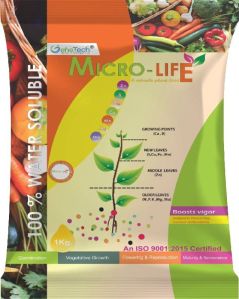
Micro Life Plant Food
Get Price Quote
100 Pack (MOQ)
Micro Life (a miracle plant food) Production Information : Seven types of micro nutrients are found in Micro-Life. These elements are in chelated form which are easily available to the plant. Its use helps in the development of the plant, more flowering, and the persistence of fruits, along with keeping the plant green. Methodology: Zinc: Supports plant growth hormone and enzyme systems. Chlorophyll is necessary for the producer, it is necessary for the formation of carbohydrates. Starch is necessary for manufacture. Helpful for seed production. Boron: Required for germination of pollen grains and growth of pollen tubes. Necessary for the formation of seeds and cell walls. Promotes maturation. Required for glucose translocation. Affects nitrogen and carbohydrates. Iron: Promotes the formation of chlorophyll. Acts as an oxygen carrier. Performs reactions associated with cell division and growth. Manganese: Acts as a part of some enzyme systems. Helps in chlorophyll synthesis. Increases availability of P and Ca. Molybdenum: Required to make the enzyme “nitrate reductase”. Which reduces nitrates to ammonium in plants. Legumes are helpful in the formation of knots. The plant needs to convert inorganic phosphates into organic forms. Copper: catalyzes many plant processes, plays a major role in photosynthesis. It plays a major role in the reproductive stages. has an indirect role in chlorophyll production. Increases the quantity of glucose, intensifies the colour, improves the taste of fruits, vegetables and cereals. Magnesium: is the main element of chlorophyll production. Improves phosphorus utilization and mobility. It is a catalyst and component of many plant enzymes. Increases the utilization of iron in the plant. Affects the haste and uniformity of maturity. Tetany is in direct contact with the grass. Advantages: Helps in complete development of plants. This production is environment friendly and suitable for organic farming.